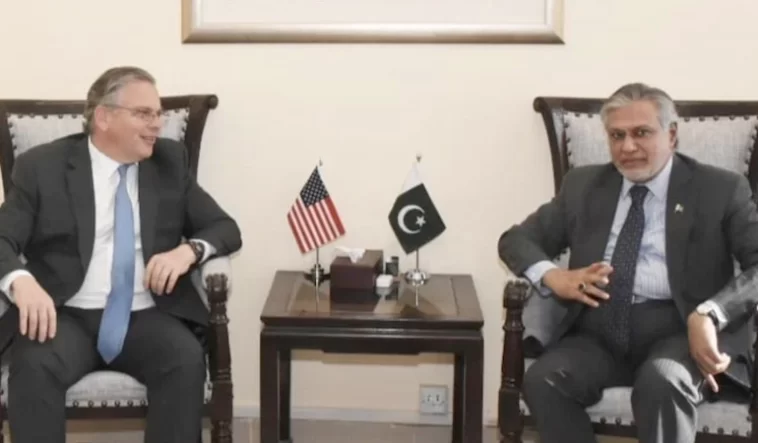Pakistan’s Finance Minister, Senator Ishaq Dar, held a meeting with the US Ambassador to Pakistan, Donald Blome, to discuss measures taken by the coalition government to address the economic challenges that the country is grappling with at the moment.
During the meeting, the US representative expressed confidence in the Pakistani government’s policies and programs to ensure economic sustainability. In addition to discussing ways to strengthen their current bilateral ties, the two sides exchanged opinions on issues of mutual concern.
In order to address the difficult economic environment and put the economy on a trajectory path, the finance minister shared the government’s economic priorities and policies. The general welfare of the populace is a top priority for the current administration, so several initiatives are being made in this direction.
The US ambassador praised the coalition government’s efforts to address economic issues and expressed support for fostering trade, investment, and other economic ties between the two nations.
The US ambassador underscored that both countries enjoy good relations and expressed confidence in the policies and programs of the government for the socio-economic uplift of the masses. He extended his support to further promote bilateral economic, investment, and trade relations between both countries.
The government’s plans for revenues and expenditures to meet its obligations on the national and international levels were disclosed to the ambassador by the finance minister. He also discussed a number of economic opportunities for both nations to further develop their trade ties.
The International Monetary Fund’s representatives conversed virtually with Pakistan’s economic team during this time (IMF). Governor of the State Bank of Pakistan (SBP), Jameel Ahmad, briefed the international financier on the financing scheme intended to increase foreign exchange reserves.
The SBP’s limited foreign exchange holdings only cover one month’s worth of imports, emphasizing the pressing need for financial assistance. Pakistan is struggling to meet the strict requirements imposed by the international lender but is desperate to unlock the next tranche of a loan facility worth $1.1 billion.
Pakistan is required by the IMF to raise its pitifully low tax base, abolish export sector exemptions, and increase artificially low energy prices set low to aid poor families. In addition to expecting financial assistance from Saudi Arabia and the United Arab Emirates, Pakistan intends to refinance from China. In a day or two, negotiations with the Washington-based lender should be concluded.
Pakistan is generally making significant efforts to address economic difficulties and advance its bilateral relations with the United States. To improve its economic situation and guarantee the welfare of its citizens, the nation hopes to obtain financial assistance from the IMF and other nations. Pakistan must adhere to IMF requirements in order to receive the next loan tranche and maintain its financial stability.


